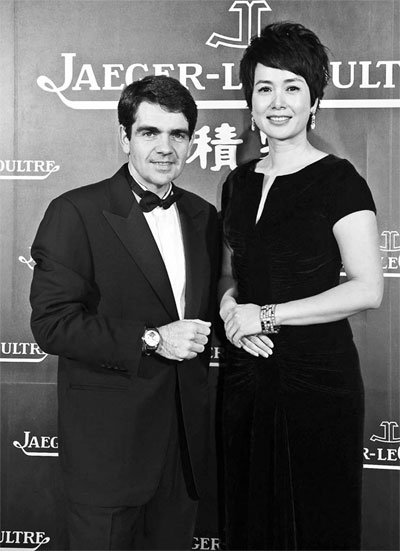Watching the classics
|
 |
|
Jaeger-LeCoultre's CEO Jerome Lambert with Jiang Wenli at the Shanghai International Film Festival.[Photo/China Daily] |
A Swiss watchmaker will restore 10 old Chinese films before a festival in 2014. Liu Wei reports.
While a watch often reminds people of time running out, one timepiece brand will help them remember the good old days - of film, that is. The 178-year-old Swiss watch manufacturer Jaeger-LeCoultre has partnered with the Shanghai International Film Festival to restore 10 classic Chinese films.
The films will be screened at the World Cruise of Jaeger-LeCoultre's Rehabilitation of Chinese Classic Films event at the 2014 festival.
A charity auction during the June 11 opening of the 14th Shanghai film festival raised money for the project.
Jaeger-LeCoultre offered the very first Duomtre Quantime Lunaire - only 200 of the limited edition pieces were produced - which sold for 600,000 yuan ($92,000).
Some filmmakers also put under the hammer the unique objects and souvenirs related to films in which they have been involved.
Academy Award-winning actress Susan Sarandon offered her outfit from the 2007 comedy Mr. Woodcock. Jury head Barry Levinson handed over the script of Rain Man, with his signature. Jiang Wenli, a mainland actress who directed her first film, Lan, in 2010, donated a manuscript recording her feelings about her first directing experience.
The first film to be restored is a 1947 picture entitled The Spring River Flows East. The movie, directed by Zheng Junli and Cai Chusheng, deals with the lives of an ordinary Shanghai family over a decade.
Since 2004, the watchmaker has been collaborating with the Venice International Film Festival to restore classic Italian films, award outstanding filmmakers and shoot documentaries about them.
Jaeger-LeCoultre's passion for cinema is not a personal preference, CEO Jrme Lambert says. It is instead inspired by the traits shared between his brand and the art medium.
"We think it's always important to keep a strong connection to arts, for the inspiration of the team and the brand itself," he says.
"We want to be active with one art that is strongly connected to the past but linked to the future. And cinema presents that message well."
The company says it wants to do in Asia - a rapidly growing market - what it has done in Venice. It has chosen China, home to a rising wealthy class, as the site for its project on the continent.
"If you want to do something in Asia, it must be done in China," Lambert says.
"China is obviously so dynamic, so integrating (of the) past and future."
Lambert has hired a personal tutor to take Chinese-language lessons twice a week. But before he starts in July, he will listen to experts from the China Film Archive and the Shanghai festival, who will suggest titles that should be restored. Priority will be given to urgent cases.
"The highest trees have the deepest roots," Lambert says.
"Jaeger-LeCoultre is 178 years old now. We see the importance of keeping a strong link to the past if we want to be connected to the future," he continues.
"China has a very strong culture of cinema, and the restoration of old films now will contribute to collections of the future."
While describing his knowledge of Chinese cinema as "very limited", the 37-year-old recalls the Golden Palm winner of the 1993 Cannes International Film Festival was Chinese director Chen Kaige's Farewell My Concubine.
The first Chinese film he saw, he says, was one of Bruce Lee's. He is impressed by John Woo's action sequences, and Ang Lee's ability to win over both the East and the West.
In Lee's Oscar-winning Crouching Tiger, Hidden Dragon, he finds more evidence of the importance of learning from tradition.
"From the film, you can see a lot of elements related to traditional Chinese culture, such as the green bamboo and the old architecture, which make it so different from Western films," he says.
"Even Picasso was aware of what was before him when he was painting. The first elements in Cubism can be seen in the paintings of Paul Czanne 30 years earlier. You need to re-appreciate something in your culture."
He takes his company's Reverso Eclipses as an example. A gentle rolling motion applied to the rowel on the side of the case makes the shutters under the watch glass slide back to reveal an enamel miniature. The design was inspired by 19th-century Europe, when it was common for particular paintings to be hidden behind curtains in houses and museums.
"It was a way to create a kind of intimacy, mystery and privacy for discovering the painting," Lambert says.
"Behind the watch there is a story, a culture to appreciate. If a watch is just reserved for decoration, it would have disappeared. It is the same story with a film. If a film is only catching the wave, it will disappear soon."
While celebrating classics, Jaeger-LeCoultre also honors new talent. It will offer 200,000 yuan to winners of the Shanghai festival's China Film Pitch and Catch program. The program is intended to discover new Chinese filmmakers and help them promote their work overseas.
"What I love about both watch making and filmmaking is the word 'quest' - the quest for new aesthetic dimensions," Lambert says.
"What we have learned from the past will help us create and invent more in the future."
















